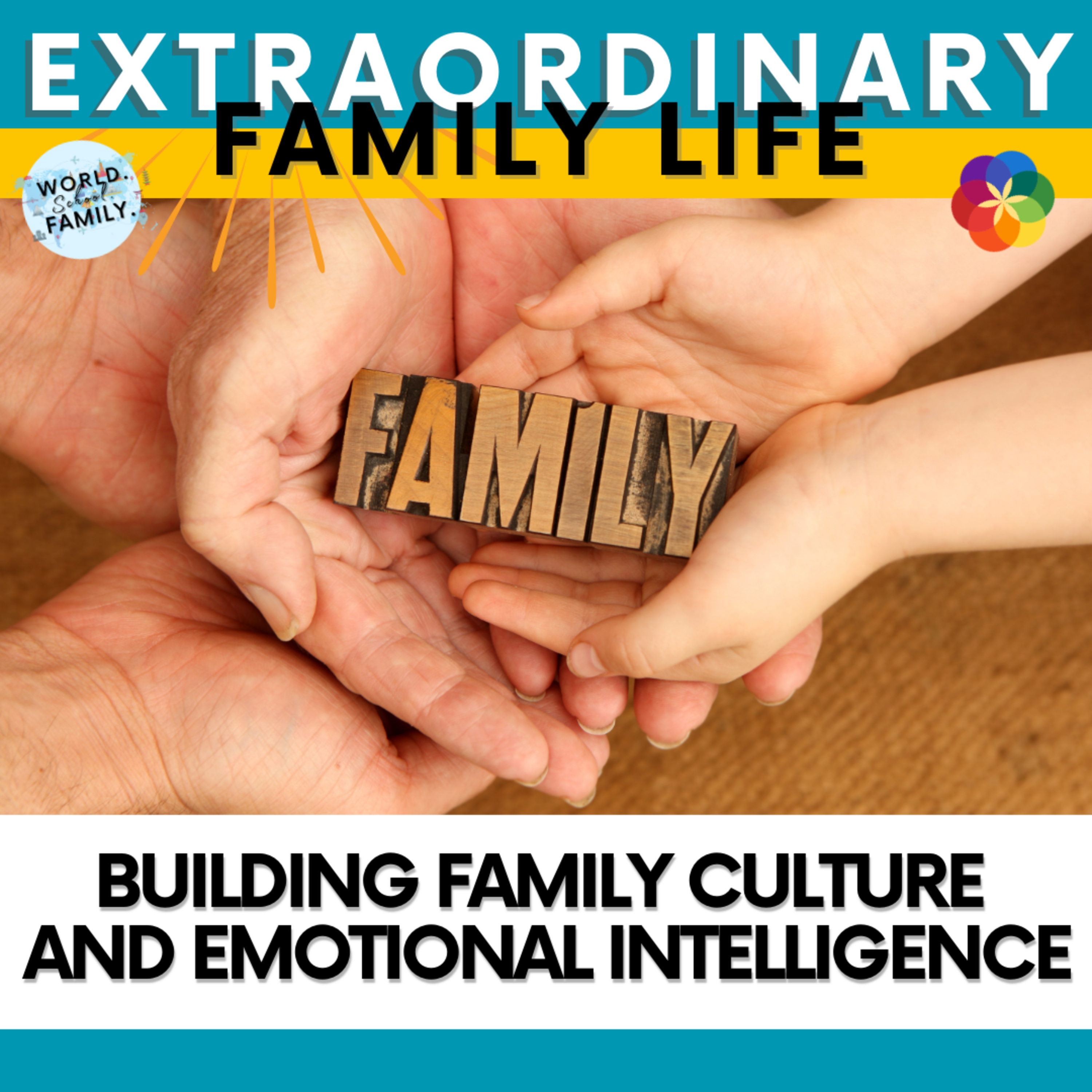How to Teach Emotional Intelligence at Home (and Why It Matters for Your Kids)

Have you ever wondered why some families seem to handle stress, conflict, and emotional ups and downs with more grace and connection? It’s not magic—it’s emotional intelligence. Emotional intelligence is the foundation of a thriving family culture, and when you cultivate it intentionally, it creates a home where everyone feels heard, safe, and connected. In our recent podcast episode, #284 Building Family Culture and Emotional Intelligence, we dive into how developing this essential skill can strengthen family bonds and emotional well-being across the board.
What Is Emotional Intelligence and Why Should You Care?
Emotional intelligence—or EQ—is the ability to recognize, understand, and manage your own emotions and those of the people around you.
In the context of family life, it’s the glue that keeps relationships strong and communication flowing.
When you foster emotional intelligence in your home, you create a culture where empathy, compassion, and mutual respect become the norm.
This doesn’t just reduce conflict—it strengthens the emotional foundation of your family and helps your kids thrive, both now and in the future.
Why Emotional Awareness Is the First Step
Before your kids (or you!) can manage emotions well, they need to notice and name them.
Emotional awareness means being tuned in to what you’re feeling and why.
It also means learning to observe shifts in energy, mood, and tone—both in yourself and others.
By teaching your kids to recognize their emotional states, you’re giving them one of the most important life skills they’ll ever learn.
Creating a Safe Space for Emotional Expression
Kids won’t open up emotionally if they feel judged, rushed, or dismissed.
That’s why safe emotional space is so crucial.
This means listening without interrupting, validating their feelings even when you disagree, and avoiding lectures when your child is simply trying to feel heard.
Connection always comes before correction.
Practical Tools for Processing Big Emotions
You don’t need a psychology degree to help your family build emotional intelligence.
Start with simple tools like:
- Journaling: Encourage your kids (and yourself!) to write down feelings—this helps process and release them.
- Mindfulness: Just five minutes a day of breathwork or stillness can increase emotional regulation.
- Active Listening: This means listening to understand, not to reply.
- Empathy: Practice saying, “I can see why you’d feel that way.”
- Emotion Vocabulary: Teach your kids more than just “mad” or “sad”—use words like “disappointed,” “overwhelmed,” or “anxious.”
Why One Person’s Mood Affects the Whole House
Let’s be honest: when one family member is emotionally off, everyone feels it.
That’s why individual emotional intelligence matters so much.
By learning to name emotions and manage them constructively, your family can support one another instead of spiraling into tension or withdrawal.
Want Better Communication? Start with Emotions
When you help your children put words to what they’re feeling, they’re less likely to lash out, shut down, or act out.
Emotional literacy fosters communication that’s clear, respectful, and productive—even during tough moments.
How to Build a Family Culture Rooted in Emotional Intelligence
Here are some intentional ways to infuse EQ into your everyday family life:
- Model healthy emotional expression: Talk about your own feelings openly (without dumping them on your kids).
- Invite emotional check-ins: Use dinner time or car rides for a quick “How are you really feeling today?”
- Celebrate emotional wins: Praise your child when they handle emotions well (“I noticed how you calmed yourself down before talking. That was awesome.”)
- Be patient: Emotional intelligence is a skill that’s built over time—not a one-and-done lesson.
The Long-Term Payoff
When you invest in building emotional intelligence in your family, you're raising kids who are resilient, compassionate, and capable of navigating life’s challenges with confidence.
You're also creating a home where trust, empathy, and understanding are normal—not the exception.
If you’re ready to build a family culture where emotions are not just allowed but valued, tune in to our latest episode, #284 Building Family Culture and Emotional Intelligence. It’s full of practical tips, inspiring insights, and real-life stories that will help you start making powerful changes today.
RESOURCES:
Let us help you in your extraordinary family life journey.
- JOIN GREG'S 90-DAY HEALTH & FITNESS CHALLENGE!
- Get Rachel's Family Systems & Charts
- Join the 28-Day Challenge for Moms
- Rachel’s Must-Read Booklist for Well-Read Moms
- Greg's Recommended Reading List for Parents & Youth
- Join the Be The Man Coaching and Tribe
- Download the Be The Man app on iOS or Android
- Take the Be The Man 7-Day Challenge.
- Follow us on Instagram: @worldschoolfamily or @greg.denning
- Gather with us at the World School Family (Beach & Farm) Resort in Portugal
- Read our reviews here: https://podcast.extraordinaryfamilylife.com/reviews/
- --- Send in a voice message: https://podcasters.spotify.com/pod/show/extraordinary-family-life/message












